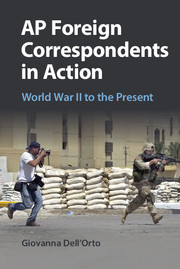Book contents
- Frontmatter
- Dedication
- Contents
- List of Figures
- Acknowledgments
- 1 Introduction
- 2 Getting Ready, Getting Started, and Getting Lost in Translation
- 3 What's the Story? News Judgment, News Pitches
- 4 Getting to the Sources (and Keeping Them Alive)
- 5 Being an American Abroad – Perceptions of Journalists
- 6 Eyewitness Reporting: Getting to the Scene
- 7 The Costs of Being There to Count the Bodies
- 8 Your Byline Today, Mine Tomorrow: Teamwork and Competition
- 9 Access, Censorship, and Spin: Relating with Foreign Governments
- 10 Flacks, Spooks, GIs, and Objective Journalists: Relating with the U.S. Government Abroad
- 11 Getting It Out, Getting It Edited: Filing News, Working with the Desk
- 12 The Evolving Milkmen: Writing for an Audience
- 13 Purpose and Influence of Foreign Correspondence
- 14 Eight Decades of Bearing Witness and Telling the World's Stories: Conclusions
- Bibliography
- Index
13 - Purpose and Influence of Foreign Correspondence
Published online by Cambridge University Press: 05 November 2015
- Frontmatter
- Dedication
- Contents
- List of Figures
- Acknowledgments
- 1 Introduction
- 2 Getting Ready, Getting Started, and Getting Lost in Translation
- 3 What's the Story? News Judgment, News Pitches
- 4 Getting to the Sources (and Keeping Them Alive)
- 5 Being an American Abroad – Perceptions of Journalists
- 6 Eyewitness Reporting: Getting to the Scene
- 7 The Costs of Being There to Count the Bodies
- 8 Your Byline Today, Mine Tomorrow: Teamwork and Competition
- 9 Access, Censorship, and Spin: Relating with Foreign Governments
- 10 Flacks, Spooks, GIs, and Objective Journalists: Relating with the U.S. Government Abroad
- 11 Getting It Out, Getting It Edited: Filing News, Working with the Desk
- 12 The Evolving Milkmen: Writing for an Audience
- 13 Purpose and Influence of Foreign Correspondence
- 14 Eight Decades of Bearing Witness and Telling the World's Stories: Conclusions
- Bibliography
- Index
Summary
Middle East correspondent Terry Anderson spent most of seven years chained to the wall in a series of dark cells after being kidnapped by militants in Lebanon in 1985. Kathy Gannon covered treacherous conflicts in Afghanistan and Pakistan over three decades and, less than a year after our interview, was gravely wounded in an execution-style attack that killed AP photographer Anja Niedringhaus as they covered Afghan national elections. Given the dangers faced and the price paid on the job, Anderson's and Gannon's answers to my question of why they did what they did – what they thought were the purpose, influence, and significance of journalism – are especially striking:
[A]sk the people who kill them [journalists], beat them, and put them in prison, whether it's important, because they all know you cannot have a free society without a free press. Period. You cannot oppress the people, you can't steal from them, you can't take away their rights in the face of a free and active press, that's why they go after the journalists, that's why everybody hates journalists. No, we're not all wonderful people, we're not all even very good at the job we do, and there are constraints, institutional constraints, societal constraints that keep us from achieving this wonderful goal of finding and telling the truth, but most of the journalists that I know are highly idealistic people with a firm sense of outrage. They try to do that as best as they can. So yeah I think it was worthwhile. I think it was worth doing. (Anderson, 29)
I want to tell the Afghan story. The Afghans’ story. I want to tell the Pakistanis’ story. I want their voice as well to be told. … To be able to get to villagers who are back of beyond, to be able to get to Pakistanis who are under threat … it is for me a joy. … I spend a tremendous amount of effort organizing it. … Like when the story about … the victims of the … American soldier that is charged with killing those 16 people. … [A crucial female witness] would never have been allowed to go to Kabul, so we went to Kandahar. And they took risks to come and talk to us, talking to foreigners, because there's of course Taliban around.
- Type
- Chapter
- Information
- AP Foreign Correspondents in ActionWorld War II to the Present, pp. 337 - 358Publisher: Cambridge University PressPrint publication year: 2015



